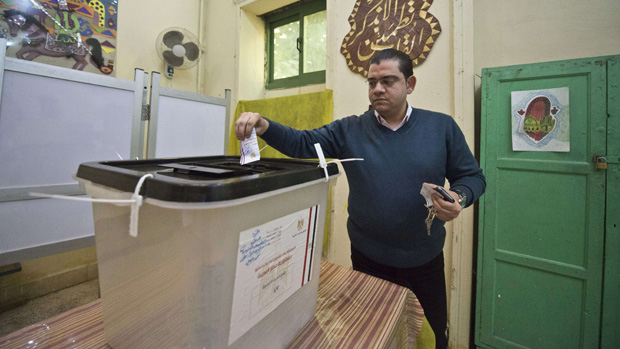Egypt: fears of violence as vote on new constitution begins
Draft charter seen as 'referendum' on removal of president Morsi and gives military more power

A free daily email with the biggest news stories of the day – and the best features from TheWeek.com
You are now subscribed
Your newsletter sign-up was successful
EGYPTIANS head to the polls today to vote on a new draft constitution. If approved it will replace a controversial charter drawn up by President Mohammed Morsi seven months before he was deposed in what his supporters describe as a military coup, says the BBC.
But what are the terms of the new constitution and what is its significance to Egypt and Egyptians?
Why is the two-day vote so important?
The Week
Escape your echo chamber. Get the facts behind the news, plus analysis from multiple perspectives.

Sign up for The Week's Free Newsletters
From our morning news briefing to a weekly Good News Newsletter, get the best of The Week delivered directly to your inbox.
From our morning news briefing to a weekly Good News Newsletter, get the best of The Week delivered directly to your inbox.
There are several reasons. It is the first time Egyptians have gone to the polls since the military ousted Morsi from power last July. Secondly, the vote on the new constitution is widely seen as a as a "referendum on the popularly-backed coup", the BBC says.
Why was Morsi's constitution so unpopular?
Many Egyptians felt the previous constitution, drawn-up by a "100-strong, Islamist-dominated panel", was unrepresentative of Egyptian society, says the BBC. Liberal and secularist groups in particular felt it failed to protect the freedoms they had won after the overthrow of president Hosni Mubarak in 2011. Critics said provisions relating to military courts and the principles of Sharia, were particularly pernicious.
Who drafted the new constitution?
A free daily email with the biggest news stories of the day – and the best features from TheWeek.com
It was drawn up by a 50-member committee that included only two representatives of Islamist parties.
What's in it?
The big picture is that the new constitution would ban religious parties and put more power in the hands of the military, says CNN. The fact that the charter will ensure the military "retains key political and judicial powers" has "dashed hopes that this summer's army takeover was a prelude to a return to full civilian rule", says the Daily Telegraph.
What else?
Under the terms of the draft charter the president may serve two four-year terms and can be impeached by parliament. Islam will remain the state religion, but freedom of belief is absolute. The state also guarantees equality between men and women and political parties may not be formed on the basis of faith, race, gender or geography.
What powers does the constitution give the military?
There are several important rights gifted to the military by the draft charter, says the Telegraph. Firstly, the armed forces will have the right to try civilians in military courts. Secondly, for the next eight years Egypt's defence minister will be a member of the military and the military council will have a veto over his appointment.
How are Morsi's supporters responding to the vote?
The ousted president's party, The Muslim Brotherhood, is boycotting the vote and there are fears of violence on the streets. A massive security operation is underway with more than 200,000 police officers and 200 combat groups deployed around polling stations. Shortly before voting began, an explosion took place near a court building in Cairo's Imbaba district, although no casualties were reported, the BBC reports.
What happens next?
If the draft is passed, it should pave the way for fresh presidential and parliamentary elections. The BBC says it now seems certain that army chief General Abdel Fattah al-Sisi - the man who orchestrated Morsi's removal - will run for president.
-
 Political cartoons for February 21
Political cartoons for February 21Cartoons Saturday’s political cartoons include consequences, secrets, and more
-
 Crisis in Cuba: a ‘golden opportunity’ for Washington?
Crisis in Cuba: a ‘golden opportunity’ for Washington?Talking Point The Trump administration is applying the pressure, and with Latin America swinging to the right, Havana is becoming more ‘politically isolated’
-
 5 thoroughly redacted cartoons about Pam Bondi protecting predators
5 thoroughly redacted cartoons about Pam Bondi protecting predatorsCartoons Artists take on the real victim, types of protection, and more
-
 Epstein files topple law CEO, roil UK government
Epstein files topple law CEO, roil UK governmentSpeed Read Peter Mandelson, Britain’s former ambassador to the US, is caught up in the scandal
-
 Iran and US prepare to meet after skirmishes
Iran and US prepare to meet after skirmishesSpeed Read The incident comes amid heightened tensions in the Middle East
-
 Israel retrieves final hostage’s body from Gaza
Israel retrieves final hostage’s body from GazaSpeed Read The 24-year-old police officer was killed during the initial Hamas attack
-
 China’s Xi targets top general in growing purge
China’s Xi targets top general in growing purgeSpeed Read Zhang Youxia is being investigated over ‘grave violations’ of the law
-
 Panama and Canada are negotiating over a crucial copper mine
Panama and Canada are negotiating over a crucial copper mineIn the Spotlight Panama is set to make a final decision on the mine this summer
-
 Why Greenland’s natural resources are nearly impossible to mine
Why Greenland’s natural resources are nearly impossible to mineThe Explainer The country’s natural landscape makes the task extremely difficult
-
 Iran cuts internet as protests escalate
Iran cuts internet as protests escalateSpeed Reada Government buildings across the country have been set on fire
-
 US nabs ‘shadow’ tanker claimed by Russia
US nabs ‘shadow’ tanker claimed by RussiaSpeed Read The ship was one of two vessels seized by the US military